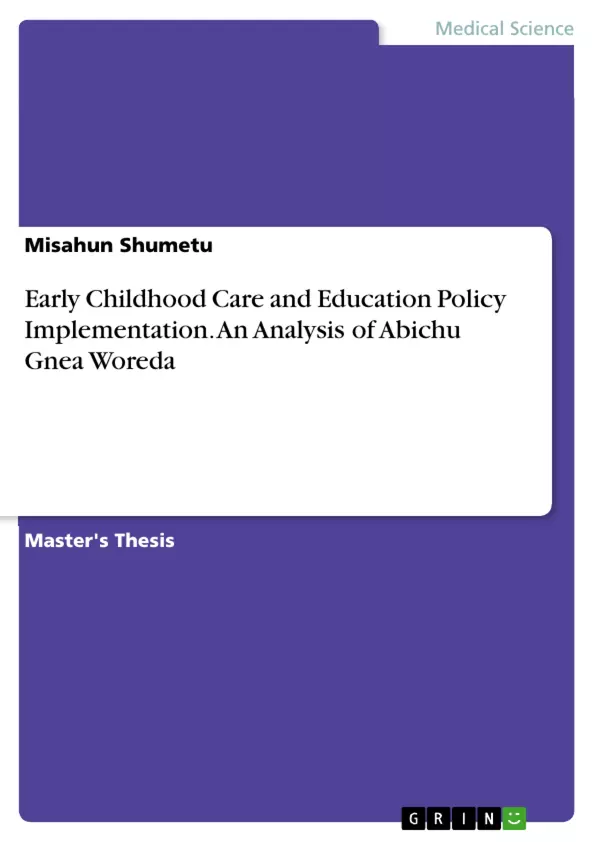The purpose of this study is to analyze the ECCE policy implementation in Abichu Gnea Woreda. The research approach was a mixed-method, with exploratory sequential design. Ten pre-primary schools were selected through stratified sampling technique. Quantitative and qualitative data were collected from pre-primary education teachers (N=21), school principals (N=10), school supervisors (N=10), parents (N=10), WEO (N=1), REB (N=1), and MoE (N=1) using questionnaire and interview.
The qualitative data obtained through the interview, observations, and document reviews were analyzed using a cross-case analysis technique. The quantitative data obtained through the questionnaire were analyzed using the Kruskal Wallis statistical test. Finally, the result was compared with the ECCE policy guideline to ascertain whether the policy is implemented accordingly.
Inhaltsverzeichnis (Table of Contents)
- Introduction
- Review of Related Literature
- Methodology
- Result and Discussion
- Conclusion and Recommendations
- References
Zielsetzung und Themenschwerpunkte (Objectives and Key Themes)
This thesis aims to analyze the implementation of Early Childhood Care and Education (ECCE) policy in Abichu Gnea Woreda. The study focuses on understanding the challenges and opportunities faced in implementing the policy and identifying potential solutions. It also aims to provide recommendations for improving ECCE policy implementation in the area.
- Analysis of ECCE policy implementation in Abichu Gnea Woreda
- Challenges and opportunities faced in implementing the ECCE policy
- Potential solutions to address the challenges
- Recommendations for improving ECCE policy implementation
Zusammenfassung der Kapitel (Chapter Summaries)
- Introduction: This chapter provides background information on the study, including the rationale, objectives, and research questions. It also defines key terms and provides an overview of the context of the research.
- Review of Related Literature: This chapter reviews relevant literature on ECCE policy implementation, particularly in Ethiopia and other developing countries. It examines existing studies and analyzes key findings, providing theoretical foundations for the study.
- Methodology: This chapter outlines the research design, data collection methods, and data analysis techniques used in the study. It describes the population, sample size, sampling procedures, and instruments used to collect data.
- Result and Discussion: This chapter presents and discusses the findings of the study. It analyzes data collected through various methods, drawing insights and implications for ECCE policy implementation in Abichu Gnea Woreda.
Schlüsselwörter (Keywords)
Early Childhood Care and Education (ECCE), policy implementation, Abichu Gnea Woreda, Ethiopia, challenges, opportunities, recommendations.
- Quote paper
- Misahun Shumetu (Author), 2020, Early Childhood Care and Education Policy Implementation. An Analysis of Abichu Gnea Woreda, Munich, GRIN Verlag, https://www.grin.com/document/1138527



